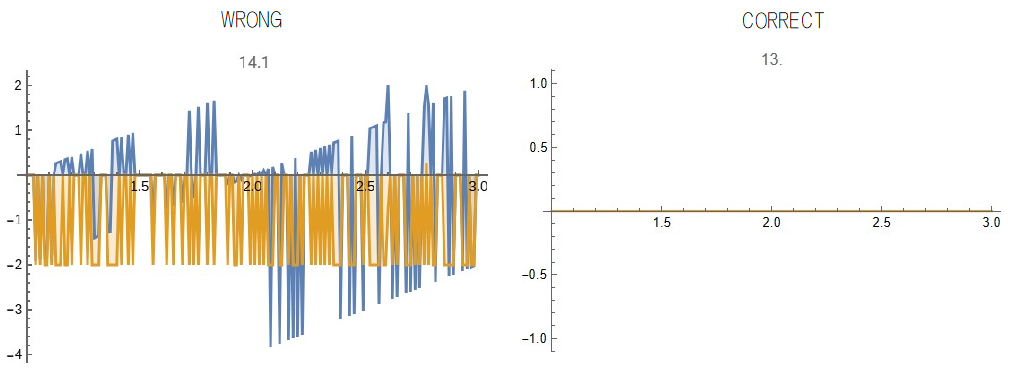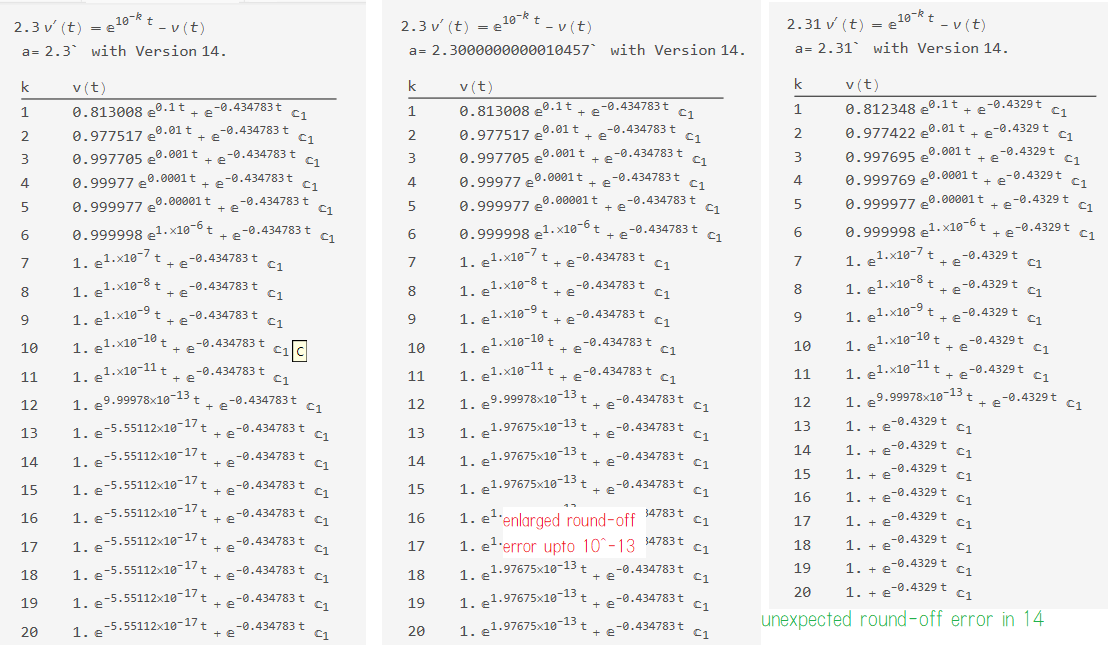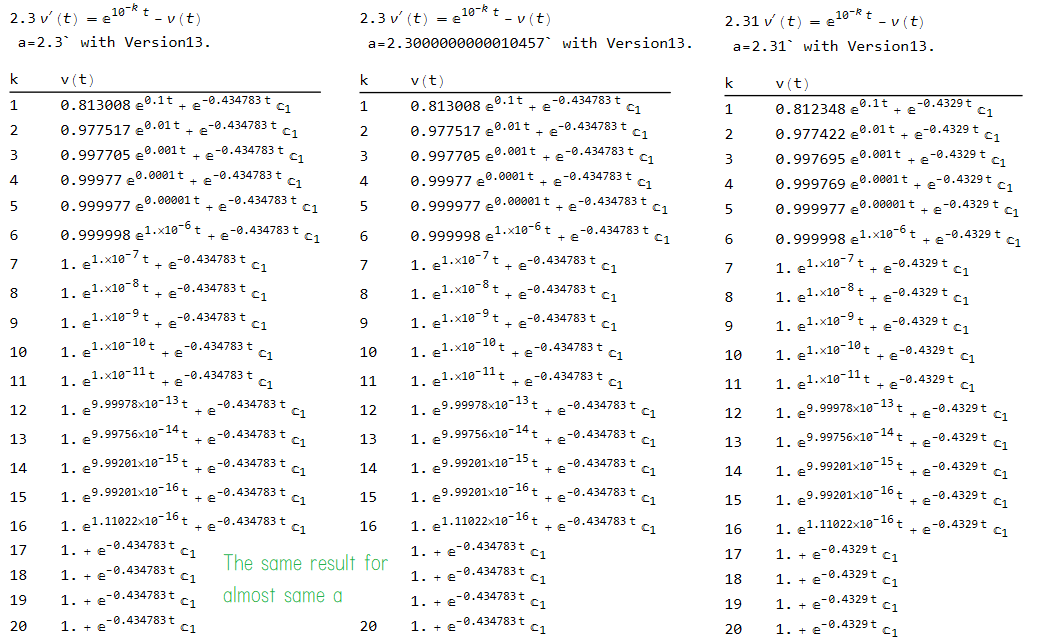Could you help me to understand the following?
In[1]:= $VersionNumber
Out[1]= 14.
In[2]:= DSolve[{2.3*r''[t]==1-r'[t],r[0]==0,r'[0]==0},r[t],t]//FullSimplify
Out[2]= {{r[t] -> -2. + 2.3 E^(-0.434783 t)}}
In[3]:= DSolve[{m*r''[t]==f-r'[t],r[0]==0,r'[0]==0},r[t],t]/.{m->2.3,f->1}//FullSimplify
Out[3]= {{r[t] -> -2.3 + 2.3 E^(-0.434783 t) + t}}
2.3 seems to be a magic number. Is this a bug?
(2024-10-23 ADD) Thank you for replies. I found version dependence. I report the result in the following by using Gianluca Gorni's DiscretePlot.
derivativeAtZero[a_] := DSolveValue[{a*r''[t] == 2 - r'[t], r[0] == 0, r'[0] == 0}, r, t]'[0];
fncAtZero[a_] := DSolveValue[{a*r''[t] == 2 - r'[t], r[0] == 0, r'[0] == 0}, r, t][0];
DiscretePlot[{fncAtZero[a], derivativeAtZero[a]}, {a, Subdivide[1., 3, 200]}, PlotLabel -> $VersionNumber]

Correct answer(right figure) : version=13.1, 13.0, 12.2?
Wrong answer(left figure) : version=14.1, 14
(2024-10-23 ADD2) Thanks to Michael Rogers' reply, I noticed a way to reveal version-dependent numerical instability.
The equation 2.3 r’’(t)=1 - r’(t) can be generalized to 2.3 r’’(t)=exp(k t) - r’(t). The following command
DSolveValue[{2.3*r''[t]==Exp[k*t]-r'[t],r[0]==0,r'[0]==0},r[t],t]//FullSimplify//FullForm//Print
gives version-dependent outputs
version 14: Times[-1,Plus[0.4347826086956521`,Times[-0.43478260869565216`,Power[E,Times[k,t]]],Times[0.9999999999999999`,k],Times[-0.9999999999999999`,Power[E,Times[-0.43478260869565216`,t]],k]],Power[Plus[Times[0.43478260869565216`,k],Times[1.`,Power[k,2]]],-1]]
version 13: Times[-1,Plus[0.4347826086956522`,Times[-0.4347826086956522`,Power[E,Times[1.`,k,t]]],Times[1.`,k],Times[-1.`,Power[E,Times[-0.4347826086956522`,t]],k]],Power[Plus[Times[0.4347826086956522`,k],Power[k,2]],-1]]
One can see small deviations of the same number 0.4347..., that is 1/2.3. In version 14, the numerical instability 0.4347826086956521 - 0.43478260869565216 = 5.55112*10^-17 appears in the solution shown by Michael Rogers.
This numerical instability depends on the number 2.3. For example, we obtain the correct answer and no numerical instability for the number 2.31 even if we use version 14.
DSolveValue[{2.31*r''[t]==1-r'[t],r[0]==0,r'[0]==0},r[t],t]//FullSimplify
(*
-2.31 + 2.31 E^(-0.4329 t) + 1. t
*)
DSolveValue[{2.31*r''[t]==Exp[k*t]-r'[t],r[0]==0,r'[0]==0},r[t],t]//FullSimplify//FullForm//Print
(*
Times[-1,Plus[0.4329004329004329`,Times[-0.4329004329004329`,Power[E,Times[k,t]]],Times[1.`,k],Times[-1.`,Power[E,Times[-0.4329004329004329`,t]],k]],Power[Plus[Times[0.4329004329004329`,k],Power[k,2]],-1]]
*)
(2024-10-24 ADD) In conclusion, I have understood that this unexpected result from DSolve was due to the numerical instability of a round-off error existing only in latest versions(>=14) of Mathematica. In the following, I report a new magic number with large round-off error (worst case), aWorst, by showing version-dependent solutions of $a\times v'(t)=e^{k t} - v(t) $ with using the following commands.
aWorst=5750000000002614783/2500000000000000000;
eq[a_,k_]:=a*v'[t]==Exp[10^-k*t]-v[t];
check[a_]:=Block[{},
Print[TraditionalForm[eq[a,k]],"\n a=",FullForm[a]," with Version",$VersionNumber,"\n",
TableForm[{#,DSolveValue[eq[a,#],v[t],t]}&/@Range[20],TableHeadings->{None,{"k","v(t)"}}]]];
check[2.3]
check[N[aWorst]]
check[2.31]
The result for version 14 shows unexpected round-off error while that for version 13 is reasonable.

 To avoid it, one can use the following quick hack.
To avoid it, one can use the following quick hack.
dSolveValue[eqs_,fnc_,arg_]:=Expand[DSolveValue[Rationalize[eqs,0],fnc,arg]]/.n_?NumberQ:>N[n];
I guess something has happened during the version update, and it might be not intended by the developer. I will report this to Wolfram support. I would like to thank you for your help and replies.